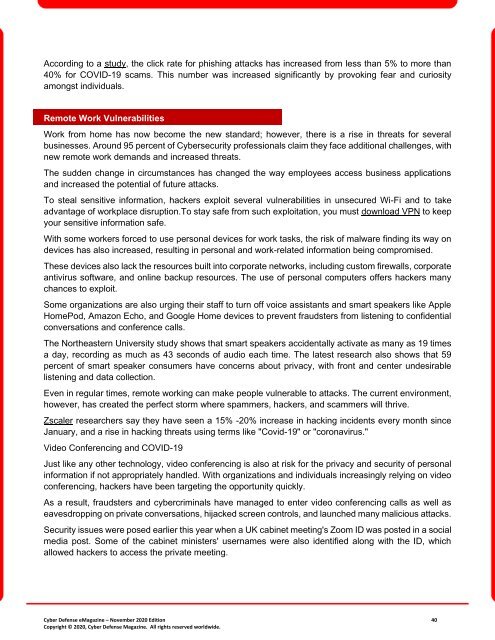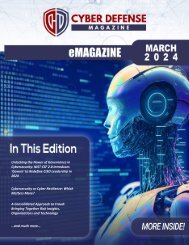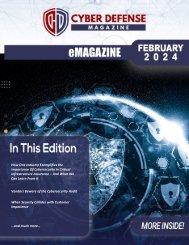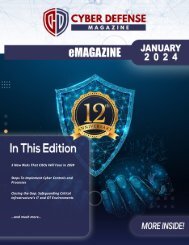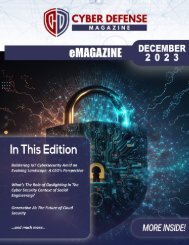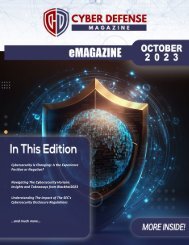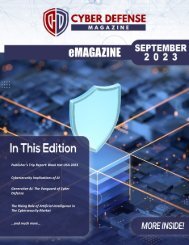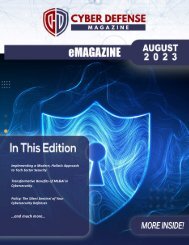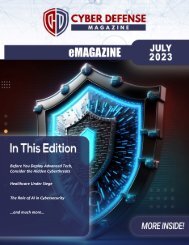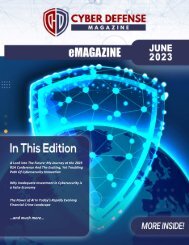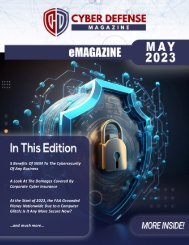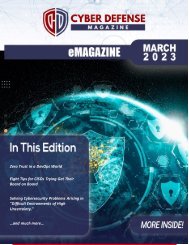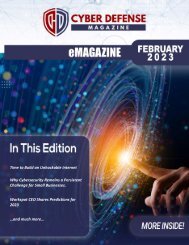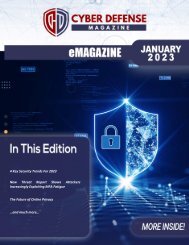Cyber Defense eMagazine November 2020 Edition
Cyber Defense eMagazine November Edition for 2020 #CDM #CYBERDEFENSEMAG @CyberDefenseMag by @Miliefsky a world-renowned cyber security expert and the Publisher of Cyber Defense Magazine as part of the Cyber Defense Media Group as well as Yan Ross, US Editor-in-Chief, Pieruligi Paganini, Co-founder & International Editor-in-Chief, Stevin Miliefsky, President and many more writers, partners and supporters who make this an awesome publication! Thank you all and to our readers! OSINT ROCKS! #CDM #CDMG #OSINT #CYBERSECURITY #INFOSEC #BEST #PRACTICES #TIPS #TECHNIQUES
Cyber Defense eMagazine November Edition for 2020 #CDM #CYBERDEFENSEMAG @CyberDefenseMag by @Miliefsky a world-renowned cyber security expert and the Publisher of Cyber Defense Magazine as part of the Cyber Defense Media Group as well as Yan Ross, US Editor-in-Chief, Pieruligi Paganini, Co-founder & International Editor-in-Chief, Stevin Miliefsky, President and many more writers, partners and supporters who make this an awesome publication! Thank you all and to our readers! OSINT ROCKS! #CDM #CDMG #OSINT #CYBERSECURITY #INFOSEC #BEST #PRACTICES #TIPS #TECHNIQUES
You also want an ePaper? Increase the reach of your titles
YUMPU automatically turns print PDFs into web optimized ePapers that Google loves.
According to a study, the click rate for phishing attacks has increased from less than 5% to more than<br />
40% for COVID-19 scams. This number was increased significantly by provoking fear and curiosity<br />
amongst individuals.<br />
Remote Work Vulnerabilities<br />
Work from home has now become the new standard; however, there is a rise in threats for several<br />
businesses. Around 95 percent of <strong>Cyber</strong>security professionals claim they face additional challenges, with<br />
new remote work demands and increased threats.<br />
The sudden change in circumstances has changed the way employees access business applications<br />
and increased the potential of future attacks.<br />
To steal sensitive information, hackers exploit several vulnerabilities in unsecured Wi-Fi and to take<br />
advantage of workplace disruption.To stay safe from such exploitation, you must download VPN to keep<br />
your sensitive information safe.<br />
With some workers forced to use personal devices for work tasks, the risk of malware finding its way on<br />
devices has also increased, resulting in personal and work-related information being compromised.<br />
These devices also lack the resources built into corporate networks, including custom firewalls, corporate<br />
antivirus software, and online backup resources. The use of personal computers offers hackers many<br />
chances to exploit.<br />
Some organizations are also urging their staff to turn off voice assistants and smart speakers like Apple<br />
HomePod, Amazon Echo, and Google Home devices to prevent fraudsters from listening to confidential<br />
conversations and conference calls.<br />
The Northeastern University study shows that smart speakers accidentally activate as many as 19 times<br />
a day, recording as much as 43 seconds of audio each time. The latest research also shows that 59<br />
percent of smart speaker consumers have concerns about privacy, with front and center undesirable<br />
listening and data collection.<br />
Even in regular times, remote working can make people vulnerable to attacks. The current environment,<br />
however, has created the perfect storm where spammers, hackers, and scammers will thrive.<br />
Zscaler researchers say they have seen a 15% -20% increase in hacking incidents every month since<br />
January, and a rise in hacking threats using terms like "Covid-19" or "coronavirus."<br />
Video Conferencing and COVID-19<br />
Just like any other technology, video conferencing is also at risk for the privacy and security of personal<br />
information if not appropriately handled. With organizations and individuals increasingly relying on video<br />
conferencing, hackers have been targeting the opportunity quickly.<br />
As a result, fraudsters and cybercriminals have managed to enter video conferencing calls as well as<br />
eavesdropping on private conversations, hijacked screen controls, and launched many malicious attacks.<br />
Security issues were posed earlier this year when a UK cabinet meeting's Zoom ID was posted in a social<br />
media post. Some of the cabinet ministers' usernames were also identified along with the ID, which<br />
allowed hackers to access the private meeting.<br />
<strong>Cyber</strong> <strong>Defense</strong> <strong>eMagazine</strong> – <strong>November</strong> <strong>2020</strong> <strong>Edition</strong> 40<br />
Copyright © <strong>2020</strong>, <strong>Cyber</strong> <strong>Defense</strong> Magazine. All rights reserved worldwide.


